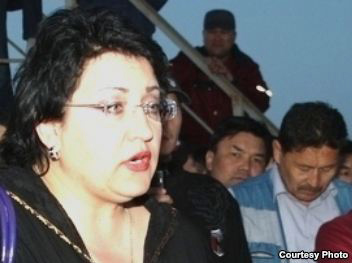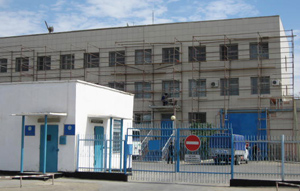 Mrs. Sokolova has only done her job as a legal representative, protecting the rights of oil workers that are demanding to run their trade union without interference from the director of the company, and to have better working conditions and higher salaries in accordance with set national standards.
Mrs. Sokolova has only done her job as a legal representative, protecting the rights of oil workers that are demanding to run their trade union without interference from the director of the company, and to have better working conditions and higher salaries in accordance with set national standards.
Since 17 May 2011, oil workers of the trade unions “Karazhanbasmunai” and “Ozenmunaygaz” have been striking, demanding improved working conditions and better salaries. As their lawyer, Sokolova attended meetings and gatherings with the oil workers, providing legal advice on the process. As a result of supporting the rights of workers , Natalya Sokolova, a legal representative of the trade union “Karazhanbasmunai”, was sentenced to six years of imprisonment in a colony of common security on 8 August 2011.
The court found Sokolova guilty of violating two articles of the Criminal Code of Kazakhstan, by inciting social, national, tribal, and racial irreligious enmity (article 164) and violating the regulations of organizing and holding meetings, rallies, pickets, marches and demonstrations (article 334). She had been held in detention since 24 May.

Since the beginning of the strikes 993 workers have been fired from the oil companies, and other workers have been hired in their place. Workers from other oil companies in the region are reluctant to join them as they allegedly have signed contracts where they promise not to go on strike. Others are put back by the pressure put on the striking oil workers through police surveillance and intimidation.
The Norwegian Helsinki Committee is concerned with Sokolova’s conviction, said Björn Engesland, Secretary General in the Norwegian Helsinki Committee: “Kazakhstan should respect freedom of assembly, freedom of association and freedom of speech of any person. Using the criminal justice system to silence a lawyer’s legitimate and peaceful fight for the rights of the oil workers is not acceptable. We call for the court to use the opportunity of the appeal hearing to reject the sentence and immediately release Sokolova. Kazakhstan chaired the OSCE in 2010, preceded by pledges to uphold human rights. Unfortunately, this case illustrates lack of respect for basic human rights as well as attacking the legitimate role of human rights defenders and labour unionists”.
N. Sokolova is not the first lawyer to be arrested by Kazakh authorities, earlier this year E. Zhovtis, prominent human rights defender, also faced criminal charges and was not given a fair trial.
The NHC is also deeply concerned over what was conceived as threatening presence of security services around strikers during a recent visit to the square in Zhanaozen, where the strikers are gathered in their fourth month.
Echoes of Arab spring:
 In response to recent developments in the Middle East, many authoritarian regimes around the world and central Asia in particular are keen to strengthen their control. Authoritarian governments in central Asia increased surveillance over internet, especially social networks and continue to keep an eye on human rights defenders in turn denying its people fundamental human rights such freedom of assembly, freedom of speech etcetera.
In response to recent developments in the Middle East, many authoritarian regimes around the world and central Asia in particular are keen to strengthen their control. Authoritarian governments in central Asia increased surveillance over internet, especially social networks and continue to keep an eye on human rights defenders in turn denying its people fundamental human rights such freedom of assembly, freedom of speech etcetera.
Earlier this year the Kazakh political elite ditched plans to make President Nursultan Nazarbayev, who has been in power since independence in 1991, the country’s unelected leader until 2020. Instead, after a popular revolution in Egypt, they organised a hasty election to prove Mr Nazarbayev’s democratic credentials. He won another term easily.
In Uzbekistan the state has filtered out images from the Arab revolutions from the internet. The CSTO (Collective Security Treaty Organization) military exercises assumed extra importance earlier this month when a militant Islamic group released a video promising to attack government forces and “non-believers” in Tajikistan. The CSTO has said it is particularly worried about the spread northwards of militant Islam once NATO leaves Afghanistan in 2014 British news agency Telegraph reports.
Related Stories
Human rights challenges in Kazakhstan
Jailed Kazakh human rights defender treated unequally
Kazakhstan: lack of respect for the rule of law and freedom of expression





